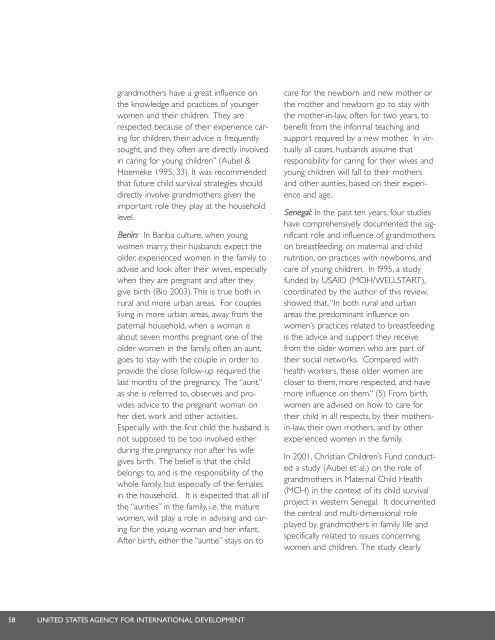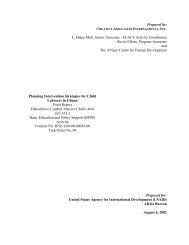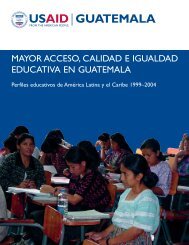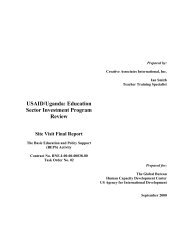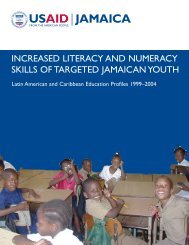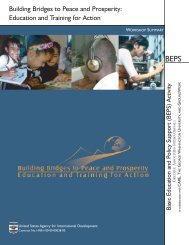Grandmothers: A Learning Institution - Basic Education and Policy ...
Grandmothers: A Learning Institution - Basic Education and Policy ...
Grandmothers: A Learning Institution - Basic Education and Policy ...
- No tags were found...
Create successful ePaper yourself
Turn your PDF publications into a flip-book with our unique Google optimized e-Paper software.
gr<strong>and</strong>mothers have a great influence onthe knowledge <strong>and</strong> practices of youngerwomen <strong>and</strong> their children. They arerespected because of their experience caringfor children, their advice is frequentlysought, <strong>and</strong> they often are directly involvedin caring for young children” (Aubel &Hoemeke 1995, 33). It was recommendedthat future child survival strategies shoulddirectly involve gr<strong>and</strong>mothers given theimportant role they play at the householdlevel.Benin: In Bariba culture, when youngwomen marry, their husb<strong>and</strong>s expect theolder, experienced women in the family toadvise <strong>and</strong> look after their wives, especiallywhen they are pregnant <strong>and</strong> after theygive birth (Bio 2003).This is true both inrural <strong>and</strong> more urban areas. For couplesliving in more urban areas, away from thepaternal household, when a woman isabout seven months pregnant one of theolder women in the family, often an aunt,goes to stay with the couple in order toprovide the close follow-up required thelast months of the pregnancy. The “aunt,”as she is referred to, observes <strong>and</strong> providesadvice to the pregnant woman onher diet, work <strong>and</strong> other activities.Especially with the first child the husb<strong>and</strong> isnot supposed to be too involved eitherduring the pregnancy nor after his wifegives birth. The belief is that the childbelongs to, <strong>and</strong> is the responsibility of thewhole family, but especially of the femalesin the household. It is expected that all ofthe “aunties” in the family, i.e. the maturewomen, will play a role in advising <strong>and</strong> caringfor the young woman <strong>and</strong> her infant.After birth, either the “auntie” stays on tocare for the newborn <strong>and</strong> new mother orthe mother <strong>and</strong> newborn go to stay withthe mother-in-law, often for two years, tobenefit from the informal teaching <strong>and</strong>support required by a new mother. In virtuallyall cases, husb<strong>and</strong>s assume thatresponsibility for caring for their wives <strong>and</strong>young children will fall to their mothers<strong>and</strong> other aunties, based on their experience<strong>and</strong> age.Senegal: In the past ten years, four studieshave comprehensively documented the significantrole <strong>and</strong> influence of gr<strong>and</strong>motherson breastfeeding, on maternal <strong>and</strong> childnutrition, on practices with newborns, <strong>and</strong>care of young children. In l995, a studyfunded by USAID (MOH/WELLSTART),coordinated by the author of this review,showed that,“In both rural <strong>and</strong> urbanareas the predominant influence onwomen’s practices related to breastfeedingis the advice <strong>and</strong> support they receivefrom the older women who are part oftheir social networks. Compared withhealth workers, these older women arecloser to them, more respected, <strong>and</strong> havemore influence on them.” (5) From birth,women are advised on how to care fortheir child in all respects, by their mothersin-law,their own mothers, <strong>and</strong> by otherexperienced women in the family.In 2001, Christian Children’s Fund conducteda study (Aubel et al.) on the role ofgr<strong>and</strong>mothers in Maternal Child Health(MCH) in the context of its child survivalproject in western Senegal. It documentedthe central <strong>and</strong> multi-dimensional roleplayed by gr<strong>and</strong>mothers in family life <strong>and</strong>specifically related to issues concerningwomen <strong>and</strong> children. The study clearly58 UNITED STATES AGENCY FOR INTERNATIONAL DEVELOPMENT


